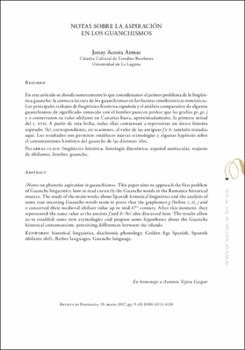Notas sobre la aspiración en los guanchismos
Autor
Acosta Armas, JonayFecha
2017Resumen
En este artículo se aborda someramente lo que consideramos el primer problema de la lingüística
guanche: la correcta lectura de los guanchismos en las fuentes etnohistóricas románicas.
Los principales trabajos de lingüística histórica española y el análisis comparativo de algunos
guanchismos de significado conocido con el bereber parecen probar que las grafías ge, gi, j
y x conservaron su valor sibilante en Canarias hasta, aproximadamente, la primera mitad
del s. xvii. A partir de esta fecha, todas ellas comienzan a representar un único fonema
aspirado: /h/, correspondiente, en ocasiones, al valor de las antiguas f y h, también tratadas
aquí. Los resultados nos permiten establecer nuevas etimologías y algunas hipótesis sobre
el consonantismo histórico del guanche de las distintas islas. This paper aims to approach the first problem
of Guanche linguistics: how to read correctly the Guanche words in the Romance historical
sources. The study of the main works about Spanish historical linguistics and the analysis of
some true meaning Guanche words seem to prove that the graphemes g (before i, e), j and
x conserved their medieval sibilant value up to mid-17th century. After this moment, they
represented the same value as the ancient f and h: /h/, also discussed here. The results allow
us to establish some new etymologies and propose some hypotheses about the Guanche
historical consonantism, perceiving differences between the islands.





